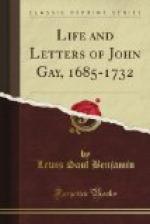“Then you must suppose that all statesmen, and your friend in particular (for statesmen’s friends have always seemed to think so) have been, are, and always will be guided by strict justice, and are quite void of partiality and resentment. You are to believe that he never did or can propose any wrong thing, for whoever has it in his power to dissent from a statesman, in any one particular, is not capable of his friendship. This last word, friendship, I have been forced to make use of several times, though I know that I speak improperly, for it has never been allowed a Court term. This is some part of a Court creed, though it is impossible to fix all the articles, for as men of dignity believe one thing one day and another the next, so you must daily change your faith and opinion; therefore the mood to please these wonderful and mighty men is never to declare in the morning what you believe until your friend has declared what he believes—for one mistake this way is utter destruction.
“I hope these few reflections will convince you that I know something of the art of pleasing great men. I have strictly examined most favourites that I have known, and think I judge right, that almost all of them have practised most of these rules on their way to preferment. I cannot wonder that great men require all this from their creatures, since most of them have practised it themselves, or else they had never arrived to their dignities.
“As to your advice that you give me in relation to preaching and marrying and ale, I like it extremely, for this lady [Mary Jennings] must be born to be a parson’s wife, and I never will think of marrying her till I have preached my first sermon. She was last night at a private ball—so private that not one man knew it till it was over, so that Mrs. Carr was disturbed at her lodgings by only a dozen ladies, who danced together without the least scandal.
“I fancy I shall not stay here much longer, though what will become of me I know not, for I have not, and fear never shall have, a will of my own.”
THE HON. MRS. HOWARD TO JOHN GAY.
August, 1723.
“After you have told me that you hate writing letters, it would be very ungrateful not to thank you for so many as you have written for me. Acting contrary to one’s inclinations, for the service of those one likes, is a strong proof of friendship; yet, as it is painful, it ought never to be exacted but in case of great necessity. As such I look upon that correspondence in which I have engaged you.
“Perhaps you think I treat you very oddly, that while I own myself afraid of a man of wit [Lord Peterborough] and make that a pretence to ask your assistance, I can write to you myself without any concern; but do me justice and believe it is that I think it requires something more than wit to deserve esteem. So it is less uneasy for me to write to you than to the other, for I should fancy I purchased the letters I received (though very witty) at too great an expense, if at the least hazard of having my real answers exposed.




